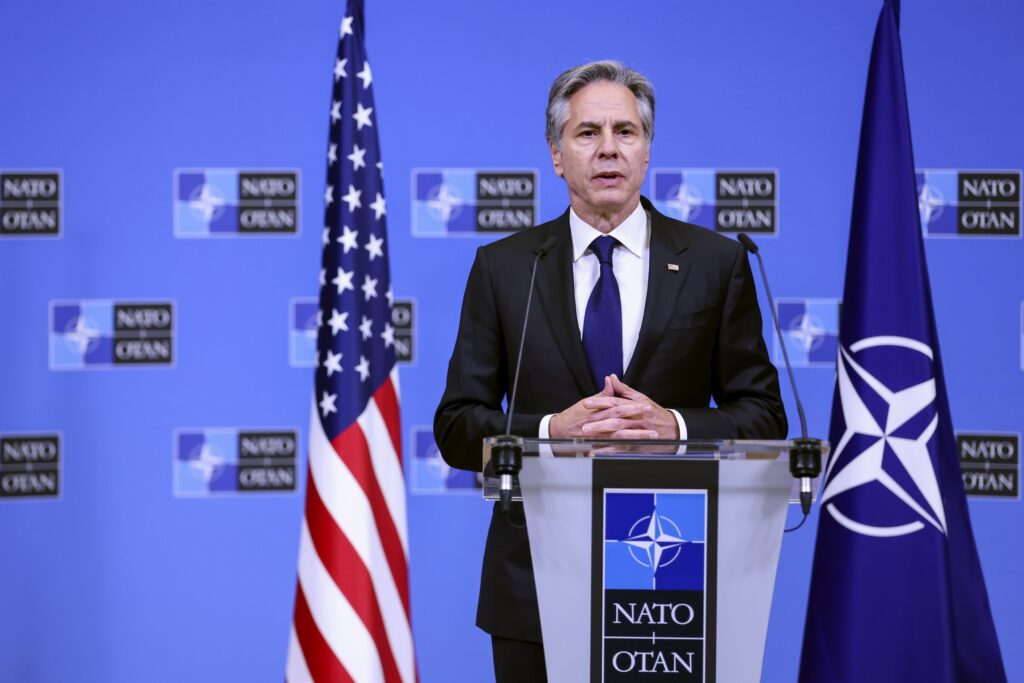
Secretary of State Antony Blinken aired a public threat to withdraw American support for Israel unless Israeli Prime Minister Benjamin Netanyahu complies with U.S. demands for “a series of specific, concrete, and measurable steps” to mitigate humanitarian suffering and civilian casualties.
“If we don’t see the changes that we need to see, there’ll be changes in our own policy,” Blinken told reporters at the outset of his NATO foreign ministerial press conference in Brussels.
His comments came just as a readout of President Joe Biden’s conversation with Netanyahu was reported, in which Biden called for a ceasefire, told Israel to address humanitarian concerns in Gaza, and “made clear that U.S. policy with respect to Gaza will be determined by our assessment of Israel’s immediate action on these steps.”
Biden and Blinken’s one-two punch points to a watershed moment in U.S.-Israel relations during the war with Hamas. Biden gave Netanyahu full-throated support in the first weeks after the Oct. 7 terrorist attack that ignited the conflict, but Israel’s prosecution of the conflict has given rise to a wave of Western frustration that has reached a fever pitch in the wake of a strike on a World Central Kitchen convoy that killed seven aid workers.
“This week’s horrific attack on the World Central Kitchen was not the first such incident. It must be the last,” Blinken said before giving a summary of Biden’s conversation with Netanyahu on Thursday. “The president emphasized that the strikes on humanitarian workers and the overall humanitarian situation are unacceptable. … He made clear that U.S. policy with respect to Gaza will be determined by our assessment of Israel’s immediate action on the steps.”

Israel Defense Forces officials have apologized for the strike, which sparked international condemnation and stoked U.S. opposition to Israel’s desire to launch a major military campaign in Rafah.
“It was a mistake that followed a misidentification — at night during a war in very complex conditions,” IDF chief of staff Herzi Halevi said in a Wednesday video. “It shouldn’t have happened.”
The strike appears to have begun an uncomfortable round of introspection in Jerusalem, where at least some officials sense that a culture of “shooting first [in Gaza] and asking questions later” has taken hold in the IDF.
“Soldiers are operating under immense pressure in very difficult conditions in which Hamas embeds itself within the civilian population, but the rules of engagement are designed to help deal with such conditions, and they’re too often being ignored,” an unnamed senior Israeli official told the Times of Israel.
CLICK HERE TO READ MORE FROM THE WASHINGTON EXAMINER
Biden also insisted that “an immediate ceasefire is essential to stabilize and improve the humanitarian situation and protect innocent civilians,” the top U.S. diplomat added. Netanyahu has refused to agree to a ceasefire unless Hamas agrees to release the hostages, but he has faced internal pressure from critics who suspect he is too hesitant to broker a ceasefire.
“President Biden reaffirmed the United States’s strong support for Israel in the face of [Iranian] threats and our commitment to Israel’s security,” Blinken said. “Right now, there is no higher priority in Gaza than protecting civilians, surging humanitarian assistance, and ensuring the security of those who provide it. Israel must meet this moment.”






